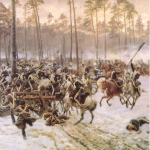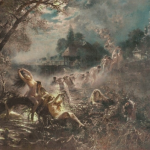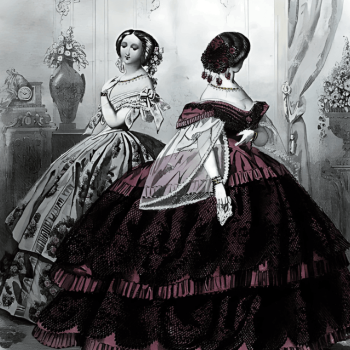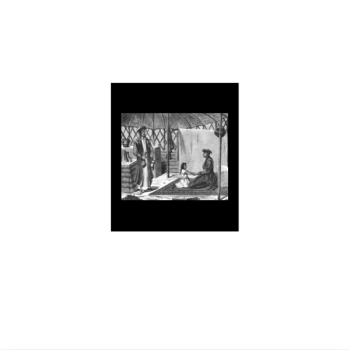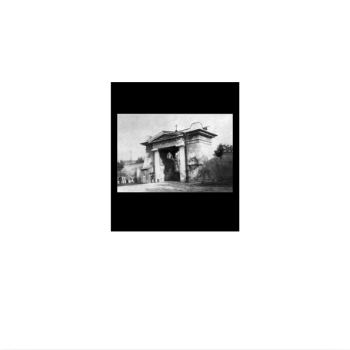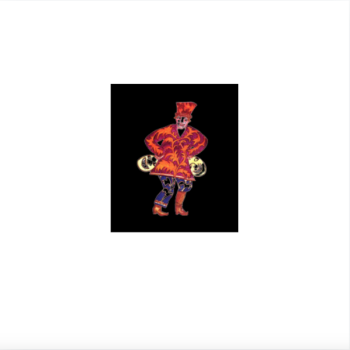“AMID COFFINS AND DESOLATION”
The precarious peace after Russia’s war with the Ottoman Empire was filled with regional battles in preparation for another fight with Turkey. One such battle was in Poland, where the patriotic feeling was aroused after Nicholas was crowned their king. The ripples of disquietude turned into riotous waves which culminated in the November Uprising in November 1830.[1] Soon after their marriage, Pyotr Alekseevich left Helena Andreevna on orders of the Tsar, to help put down the insurgency. Helena Andreevna soon learned that she was pregnant. She decided to go to Ekaterinoslav, to her parent’s home, and have the child there.
1831 was a fatal year for Russia, as it was for all of Europe, and the plague carried away large swaths of populations. Cholera raged with particular ferocity in Ekaterinoslav, especially in the Fadeev household. Over ten days in July, six people died, including some house servants. During these incidents Baba Lena showed true Christian self-sacrifice; personally seeing to the care of the sick people, giving them medicine, cleaning them, and consoling them. Despite all this, the disease, miraculously, did not affect her.[2]
It was in this atmosphere, during the night between July 30, and July 31, 1831, that Helena Andreevna ushered into the world, “amid coffins and desolation,” a little girl she named Helena “Lelya” Petrovna Hahn.[3] As was tradition in the Orthodox Church, on the very day on which Helena Andreevna became a mother, the priest went to her chamber and offered up a holy thanksgiving for her and the child.[4] Weak and (apparently) not long for the world, a hurried baptism was resorted to for baby Lelya, “lest the child die with the burden of original sin on her soul.” Baptism, the first of the seven mysteries (sacraments) of the Orthodox Churches was always preceded by an Exorcism, for the evil one was said to dwell within the bodies of the unbaptized.[5]
The room selected for the ceremony in the family mansion was large, but the crowd of devotees eager to witness it was still larger. Every one of the spectators and actors who stood during the baptismal rite (no one was allowed to sit during an Orthodox service) was furnished with a consecrated wax candle that had been lit. The officiating Priest stood in the center of the room with his long-haired assistants in their golden robes. Behind him were the pairs of godmothers and godfathers, and the three pairs of Sponsors who answered as proxies for the one-day-old catechumen. There was also the whole household of vassals and serfs, many of whom had just attended the funeral services for their relations who died from cholera. Two-year-old Nadya Andreevna was placed as “proxy” for Lelya in the first row immediately behind the venerable Priest
The Priest began the First Exorcism. “The Lord layeth thee under ban, O Devil,” he said. “He who came into the world, and made his abode among men, that he might overthrow thy tyranny and deliver men; who also upon the Tree did triumph over the adverse powers, when the sun was darkened, and the earth did quake, and the graves were opened, and the bodies of the Saints arose; who also by death annihilated Death, and overthrew him who exercised the dominion of Death, that is thee, the Devil. I adjure thee by God, who hath revealed the Tree of Life, and hath arrayed in ranks the Cherubim and the flaming sword which turneth all ways to guard it.”
This was followed by the Exclamation, and the Second Exorcism. “Let us pray to the Lord,” said the Priest. “God, holy, terrible and glorious, who is unsearchable and inscrutable in all his works and might, hath foreordained for thee the penalty of eternal punishment, O Devil: the same, through us, his unworthy servants, doth command thee, with all thy confederate hosts, to depart hence from her who hath been newly sealed in the Name of our Lord Jesus Christ, our true God.”
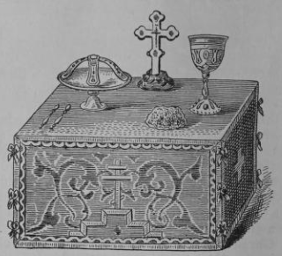
Table Of Oblation. [6]
Then the Third Exorcism. “O Lord of Sabaoth, the God of Israel, who healest every malady and every infirmity: Look upon thy servant; prove her and search her and root out of her every operation of the Devil. Rebuke the unclean spirits and expel them, and purify the works of thy hands; and exerting thy trenchant might, speedily crush down Satan under her feet; and give her victory over the same, and over his foul spirits; that, having obtained mercy from thee, she may be made worthy to partake of thy heavenly Mysteries; and may ascribe unto thee glory, to the Father, and to the Son, and to the Holy Spirit, now, and ever, and unto ages of ages. Amen.”
The priest then concluded with the Fourth Prayer. “Thou who in verity existest, O Lord the Master; who hast created man in thine own likeness, and hast bestowed upon him the power of life eternal; who also despisest not those who have fallen away through sin, but hast provided salvation for the world through the incarnation of thy Christ: Do thou, the same Lord, delivering also this thy—creature from the bondage of the enemy, receive her into thy heavenly kingdom. Open the eyes of her understanding, that the light of thy Gospel may shine brightly in her. Yoke unto her life a radiant Angel, who shall deliver her from every snare of the adversary, from encounter with evil, from the demon of the noonday, and from evil visions.
Then the Priest breathed thrice upon Nadya’s mouth, head, and breast, as often making the sign of the cross, saying: “Expel from her every evil and impure spirit which hideth and maketh its lair in her heart. The spirit of error, the spirit of guile, the spirit of idolatry and of every concupiscence; the spirit of deceit and of every uncleanness which operateth through the prompting of the Devil. And make her a reason-endowed sheep in the holy flock of thy Christ, an honorable member of thy Church, a consecrated vessel, a child of the light, and an heir of thy kingdom ; that having lived in accordance with thy commandments, and preserved inviolate the seal, and kept her garment undefiled, she may receive the blessedness of the Saints in thy kingdom.”
Nadya, drowsy in the overcrowded room on that hot August day, and tired from standing still for nearly an hour, decided to settle on the floor (unbeknownst to the adults) and play with her lighted taper.
The priest then said in a loud voice: “Through the grace, and bounties, and love towards mankind of thine Only begotten Son, with whom thou art blessed, together with thy most holy, and good, and life-giving Spirit, now, and ever, and unto ages of ages. Amen.”
The Priest then turned Nadya to face the west. “Do thou renounce Satan, and all his Angels, and all his works, and all his service, and all his pride?”
“I do,” the Sponsors replied.
The Priest again asked the question, “Hast thou renounced Satan?”
“I have,” said the Sponsors.
“Breathe and spit upon him,” said the Priest.
There was now fragrance in the air not at all like incense.
The Priest then turned Nadya to face the east, and with his hands lowered said, “Dost thou unite thyself unto Christ?” [7]
The fragrance was stronger, but by now everyone knew its source. The heat was intense, and even the old Priest had difficulty maintaining decorum and solemnity. It seems that while Nadya had been playing with the taper candle, she had somehow inadvertently set fire to the Priest’s long flowing robes. Several people (chiefly the old Priest) were severely burnt. The superstitious townsfolk of Ekaterinoslav feared that this was a bad omen—and that young Lelya was henceforth doomed to an eventful life, “full of vicissitude and trouble.”[8]
-
- NOVOROSSIYA
- The Arbiter Of Europe’s Destiny.
- The House Dolgorukuy
- Madame Krüdener
- Ekaterinoslav
- The Arabat Arrow
- The Mystery Of General Inzov
- The Doukhobors
- Pushkin
- Chuguev Military Settlement
- “The Blessed”
- The Decembrists
- Penza
- Independence
- Last Words Of Samuel Khristianovich Kontenius
- “Amid Coffins And Desolation”
- Rusalka
- Dead Souls
- Secret Passages
- Astrakhan
- Nevsky Prospekt
- Kalmyk Ulus
- Love And Ambition
- Duellistes
- Pyatigorsk
- A Heroine Of Our Time
- Winter Palace
- Zeneida R-Va
- Steppes
- Letter To Natalya
- Fire And Ice
SOURCES:
[1] A Counsellor At Law. A History Of The Revolutions In Europe Since The Downfall Of Napoleon. A Counsellor At Law. New York, New York. (1831): 312, 316, 325, 356,359.
[2] Fadeyev, Andrei Mikhailovich. Vospominaniia: 1790-1867: Vol. I. Vysochaishe Utverzhd. Yuzhno-Russkago. Odessa, Ukraine. [Russian Empire.] (1897): 108.
[3] This is the Old-Style Julian date. In the New Style Julian Calendar, this would be between the August 11/August 12, 1831. Under the Gregorian Calendar, this would be between August 23/August 24, 1831.
[4] Porter, Robert Ker. Travelling Sketches In Russia And Sweden: Vol. II. Hopkins And Earle. Philadelphia, Pennsylvania. (1809): 62.
[5] (An Ecclesiastic.) The Russian Church: A Sketch Of The Orthodox Greek Faith. Alexander Heylin. London, England. (1854): 15-16.
[6] Hapgood, Isabel Florence. Service Book Of The Holy Orthodox-Catholic Apostolic (Greco-Russian) Church. Houghton, Mifflin And Company. Boston, Massachusetts. (1906): 272-286.
[7] Hapgood, Isabel Florence. Service Book Of The Holy Orthodox-Catholic Apostolic (Greco-Russian) Church. Houghton, Mifflin And Company. Boston, Massachusetts. (1906): 272-286.
[8] Sinnett, Alfred Percy. The Letters Of H. P. Blavatsky To A. P. Sinnett And Other Miscellaneous Letters. T. Fisher Unwin Ltd. London, England. (1925): 150.


